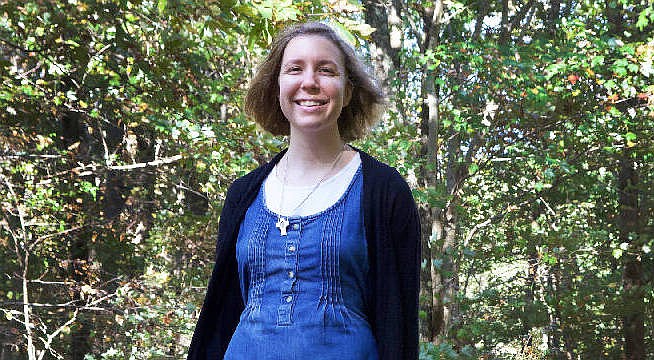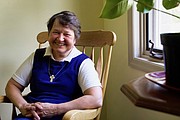As the asphalt road going southwest from Sewanee, Tennessee, gives way to gravel, the houses along the roadway become less frequent and cellphone service drops off. The woods thicken before revealing a gray stone building whose residents, while secluded, have become a community fixture.
People come to the house for the Monteagle Mountain views, the time in nature and the sense of peace that echoes throughout the building's living rooms and chapel. The surrounding woods drown out man-made noise from nearby highways.
For the four women who live at the Community of St. Mary, the environment is not just something to marvel at, it is a teaching tool, a guide and a way to connect with God. Anglican nuns have lived on the mountain since 1888, serving their neighbors in the nearby town. At times, the service has involved food or education. The lessons of the community have survived world wars and multiple technological revolutions.
More and more, though, people are coming to the house in Sewanee to spend less time tethered to screens and more time in touch with the world that surrounds them.
Ministry in the moment
The sisters in Sewanee say there is a connection between the multiple increasing social problems in America and Americans lacking relationships to nature and people.
According to a 2018 Nielsen study, Americans spend more than 11 hours a day looking at screens - from computers to smartphones to TVs - a number that is a one-hour increase from a similar study in 2016. A 2017 report, funded in part by conservation groups, found that today's average American spends less time in nature and has less access to it than previous generations.
As people move further away from nature, in body and spirit, they increasingly believe they can control the environment. They focus more on their independence than the people around them. This mindset has led to the degradation of the world and the increasing damage of climate change, said Sister Madeleine Mary Hodges. An ecological focus is a spiritual focus, she said.
"We think of [the climate] as an abstract idea, but it affects us every day," Hodges said. " People need that view. They need to be out in nature because that's how you go into yourself. That's how you find peace."
The sisters host four worship services a day as well as providing educational events, meals, retreats and spiritual direction. Each year, more than 6,000 visitors come to the convent, though many come multiple times a year. In decades past, many of the visitors learned about the community by word of mouth. Now, internet searches and social media bring guests.
Guests can receive spiritual guidance from the sisters who live at St. Mary or wander the grounds, which include a lavender garden, vegetable garden and labyrinth. They can go to the chapel to pray or stay in the community's hermitage.
The Benedictine community lives a life of prayer and service, with a special focus on connection to nature. The community grows and sells lavender and manages the small bush-lined labyrinth, a place for walking meditations.
The community hosts interns every year with its Sacramental, Organic, Intentional Living program (SOIL), with one opportunity lasting three months and the other 10 months. The students, either recent graduates or undergraduates, work in the garden and on the grounds to foster a deeper sense of spirituality with the earth at the same time they are assisting with worship at the community. The program is part of a grant from the Jessie Ball duPont Fund, which has paid for 22 interns at the community so far.
Leonard King, 58, has worked in the garden off and on since he was 16 years old. With a degree in botany, he runs the educational garden that school groups visit and advises some of the interns. When he was a teenager, the community gave him a scholarship to attend community college, he said.
"Working for them is sort of like giving back, helping pass it along," King said.
People want a deeper connection with the world, but our technology and our society have kept us from remembering how, Hodges said. Social media has become an entire world onto itself, a world that does not require as many real, face-to-face relationships, she said.
"People underestimate how much of a gift it is to really listen, to really listen to a person," Hodges said. "We got really good at putting every little thing on Instagram or posting it on Facebook and pretending we have friends."
Many of the friends of the St. Mary community do not schedule visits. They just walk through the door. They bring their spiritual, mental or physical needs with them and the sisters respond, Hodges said. The community used to have a grant to be able to help people pay for bills and food, but now they show people other local resources.
The sisters live in a moment-by-moment ministry.
"Here, people literally walk in, then that becomes your ministry," Hodges said. " We may have an idea of what we are going to do in a given day, but we never really know. Sometimes you talk to them. Sometimes you just let them walk the grounds. And sometimes you have to dry their tears and remind them they are not worthless. That they are the single creation of a God that's unique."
Stoking the embers
The sisterhood of St. Mary began in 1865 with Harriet Starr Canon in New York, though the sisters in Sewanee trace their history more directly to the sisters who were sent to Memphis to create a school for girls in the 1870s. When the city was devastated by yellow fever in 1878, and thousands of people fled, the sisters stayed to care for the sick. The one surviving sister, Hughetta Snowdown, among the "Martyrs of Memphis," moved to Sewanee, where she founded the community and later opened an all-girls school on the mountain.
The sisters on the mountain today still channel the energy and passion of the martyrs, they said. The community may be small, but religious life is not dying, Hodges said. She has been asked that question for 30 years but the community still exists, though many people are not aware there are opportunities for religious life in the Episcopal Church. The convent survives mostly on donations and sales of its greeting cards, jams and photography.
There are periods of growth and crisis among religious communities, but there will always be a need for spiritual direction, Hodges said.
"You stoke the embers and keep the embers going and it will flame up again. That's how I think about religious life," she said.
The Sewanee community spans generations. Hodges joined in 1970, while Sister Hannah Winkler will be eligible for her final vows in December 2020. The 33-year-old oversees the guest ministry at the community, as well as the ministry of jokes, as she described it. When she is not managing the property's hermitage or guest rooms, she runs the community's social media accounts, too.
Winkler always wanted to be in a helping profession. She was raised Baptist and went to a Roman Catholic school as a child and ended up studying to become a hospital dietitian. But the work in the medical field was not what Winkler was looking for. She wanted a more meaningful connection with the people that surrounded her.
"I wanted to pray with people more than I wanted to tell them not to eat a cookie," she said.
She found the Episcopal nuns with a Google search for convents she could drive to from her home in North Carolina. Now, she can guide people who want to slow down and get in touch with their spirituality.
"We see people from all walks of life," Winkler said. "Not just Episcopalians. Not just women. But social workers, people in crisis, retired priests."
Among the many guests, the sisters at St. Mary said, there is always a desire for spirituality, even at a time in history where America is growing more secular. People are longing for a spirituality that speaks to them despite all the voices and ideas that pull them in directions away from religion, Hodges said.
"I think about how courageous it is to have a prayer life, a daily prayer life, that you're committed to," she said. "People will say, 'Isn't there something better you could be doing with your time?' Being a spiritual person today is a challenge."
From the reporter
I became a journalist to help people see people as people. But highlighting the human side of every policy decision, and how it is affecting your community, takes time as well as support from readers. If you believe in telling the stories of people in your community, please subscribe to the Times Free Press today. Contact me at wmassey@timesfreepress.com or 423-757-6249. Find me on Twitter at @News4Mass.

